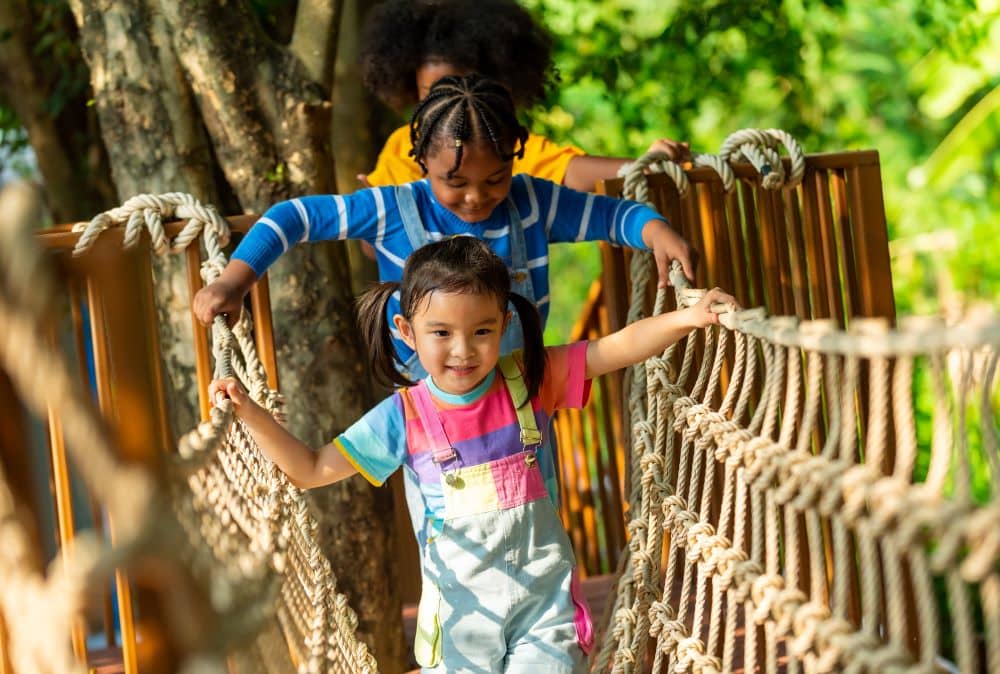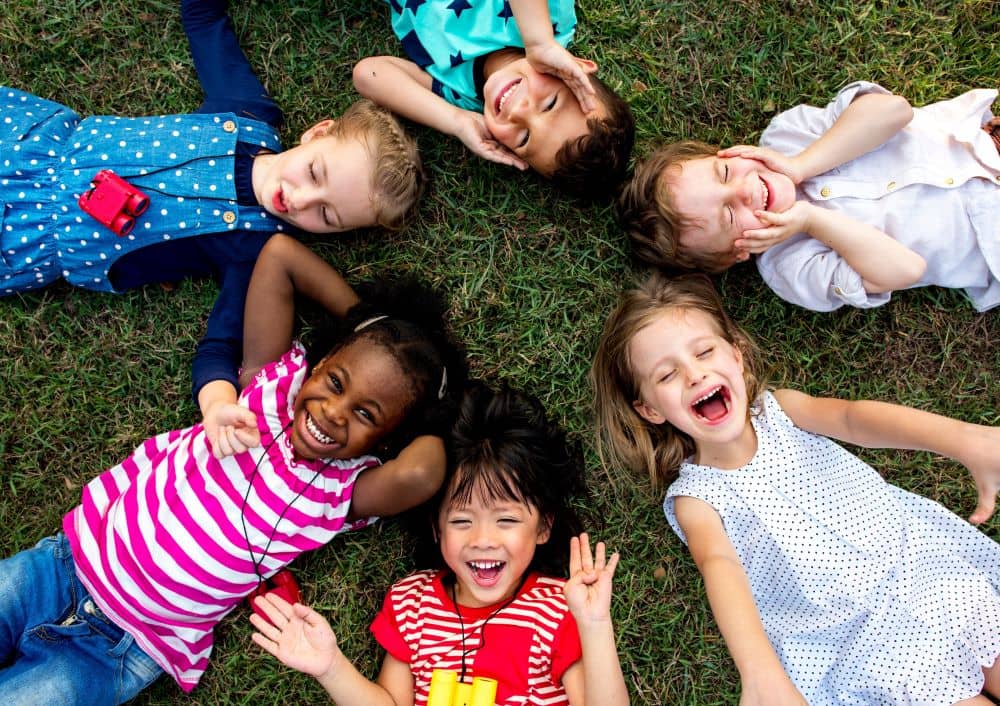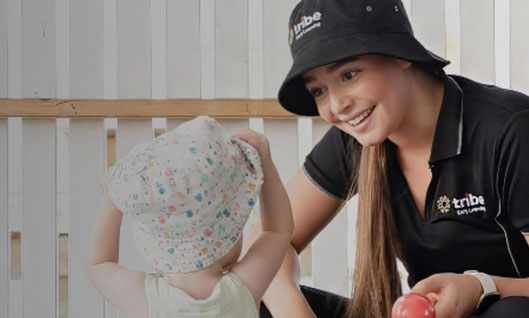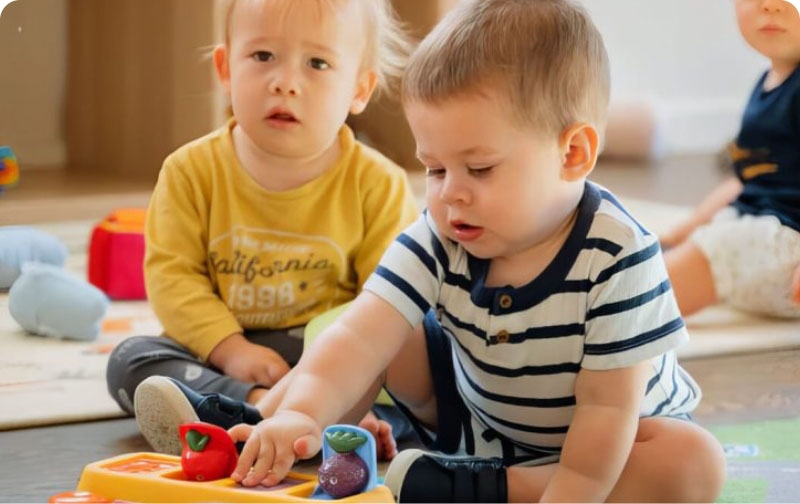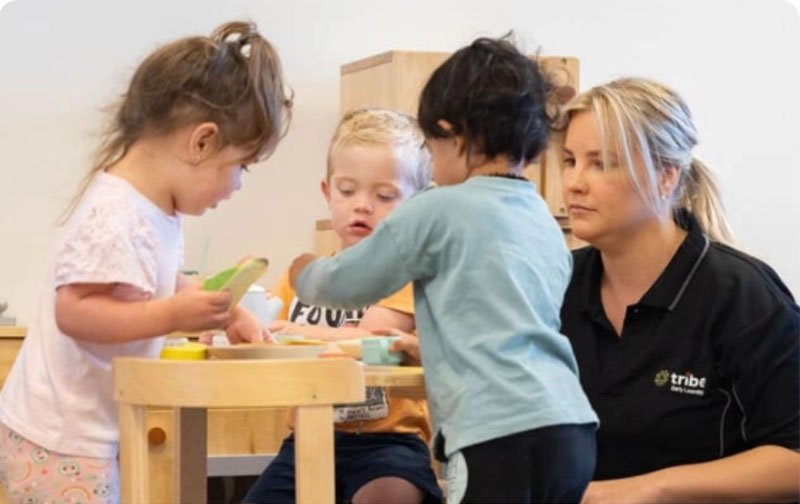A Cambridge study supports the idea that children who play outside cherish nature as they become adults. This benefit is not seen in kids who sit on the couch and watch TV all day. According to this study, 87% of surveyed adults experienced playing outdoors when they were young. They retained their love of the natural world into adulthood.
Additionally, 84% of the respondents said they prioritise caring for the environment above other activities. It can be concluded through the research that children who play outdoors can grow up to have positive views of the environment and take action for its preservation.
5 Reasons Why Nature-Based Play is Great for Children in Daycare
According to the CDC, people, including kids, now spend 7.5 hours in front of a screen, such as a mobile device and TV. OSF Healthcare recommends that parents allow no more than an hour of screen time per day for children two to five years old. But you know that’s easier said than done. Thankfully, you have daycare centres helping parents like you, so your child gets to explore the outside world.
We’re not just talking about going to the playground, where kids fight for their turn to slide or go on the swing. Instead, daycare centres are promoting nature-based play.
But what is it about?
Nature-based play is when daycare kids are allowed to enjoy unstructured play in outdoor settings. They get to interact with natural elements, including rocks, sand, water, and logs, instead of manufactured play equipment like ball pits, playhouses, and seesaws. So, why are daycare centres encouraging children to play using these natural features? Here, we give you five reasons why nature-based play is essential to daycare children:
1. Intellectual Benefits
The beauty of the natural world is its vastness, like an open-ended laboratory that children can explore almost without limits. Innately, children are scientists and are therefore encouraged by their love for experiencing sights and sounds, along with scents and textures. That’s why nature play is so beneficial, especially for early learners.
The outdoors is where daycare children can have these opportunities to learn, be more creative, and solve problems. It’s also where they can be introduced to STEM education with a focus on developing their mathematical and scientific skills, as well as critical and creative thinking.
Daycare kids experience authentic learning as they take risks. They are not afraid to fail and try again, which instils confidence and resilience. Some brain-developing nature activities include:
- Gazing at and familiarising themselves with cloud appearance
- Building with dirt, mud, and twigs
- Jumping in puddles
- Worm-watching
- Listening to birds
- Smelling fresh grass and flowers
Children interacting with natural environments are more eager to learn because they are directing their own experiences. They question what’s around them, think deeper, and create hypotheses, which help in developing inquisitive minds. Perhaps they are assessing the distance between two spaces before leaping or wondering where certain insects head during wintertime. Children are constantly thinking, no matter what they are interested in, which is a wonderful outcome of nature-based play.
2. Physical Benefits
Just like adults, children find fresh air invigorating. Aside from the endless opportunities for playing, the activities are often helpful in building strong bodies. Nature play means daycare kids are exposed to sunlight, which gives them the essential Vitamin D, a contributor to healthier immunity.
Spending time outdoors allows children to become more physically active. That’s easy to see if you compare kids who stay indoors and watch TV or play with their phones. As a result, kids involved in nature play burn more calories, which positively enhances their overall fitness. For example, running and chasing a friend can increase agility and stamina, whilst jumping can help with bone density and stability.
Staying outdoors is also good for eye health. Many kids grow up with myopia, also known as short or near-sightedness. According to Australian statistics, over 411,000 children have long-term eye disorders, and most cases are myopia. Using devices for extended periods contributes to the development of the disease. That’s why daycare centres encourage kids away from screens by providing them with a more enjoyable time outdoors.
Some outdoor activities that they can engage in with the guidance and supervision of daycare professionals are:
- Climbing trees
- Chasing one another
- Falling over
- Standing on one foot
- Jumping over puddles
- Hanging from bars
It’s a fun-filled day, for sure – even if sneakers get wet and knees get bruised. There’s a reasonable balance of safety and risk, so parents need not worry about their children. They are all in safe hands. The challenges are there to allow them to learn, discover, and gain new skills.
3. Emotional Benefits
Being surrounded by nature feels good. Kids can explore freely, move about, and make as much noise as they want. It delights them to express themselves, which is something that they typically cannot do when in a classroom. In nature, they can hop, run, skip, climb, and shout. These activities are relaxing for kids and help reduce tension, restlessness, and anxiety.
The natural earth colours are also quite calming, giving children a sense of peace. As they grow up, they are more nurturing and caring to animals, plants, and other people.
Another tremendous emotional benefit is that being outside can slow down energetic children. Sometimes, kids find it challenging to settle, but certain activities, such as watching an insect crawl, can calm them. They are encouraged to dig holes in the sand, play with sticks in a puddle, and inspect a flower.
Several studies support nature exposure’s benefits to kids showing symptoms of anxiety and attention deficit hyperactivity disorder (ADHD). This is crucial, especially since more than three in four children (mostly boys) in Australia are diagnosed with ADHD, whose symptoms continue until adulthood. ADHD is a disorder that affects the executive functioning of the brain, making it difficult for children to control their words, thoughts, emotions, and actions.
Furthermore, children who play outdoors gain more resilience, which helps develop self-confidence. They are encouraged to try even if they keep failing. Good daycare teachers are around to support them when the kids do not accomplish their goals.
Finally, children who can engage in nature play often grow up to be independent. A critical tenet of outdoor daycare is child-initiated instruction, also known as child-directed learning. The difference is easily discernible. In a traditional classroom setting, the teacher is in charge of the lessons and goals for the day.
Meanwhile, in a child-centred learning setting, the kids are not passively receiving and retaining information. Rather, they discover lessons based on nature encounters, which positively fosters independence, curiosity, and innovation.
4. Social Benefits
Children who play outdoors usually interact with other kids, which helps them build friendships. Of course, they can choose to play alone, but it’s an excellent opportunity to meet new people and gain more playmates. They eventually learn to share and solve problems with one another.
Children soon understand that it helps to collaborate with others, making the games they made up to be even more fun. There are no prescribed rules and instructions, which further provide kids with the chance to explore the outside world.
Even boisterous and extremely active kids tend to slow down as they focus on learning to be gentle with their new friends. It’s a great benefit, as this is where empathy develops. When someone is hurt or sad, they rush to console the other kid, which helps them grow up to be compassionate adults.
Additionally, studies have shown that kids who spend most of their time outdoors are more cooperative than those who stay indoors. They are more expressive, which is useful in social settings. This means they can verbalise what they want and expect without interrupting an ongoing play. In contrast, children who remain indoors playing video games – even if they interact with others through chatting – do not gain adequate social skills.
As mentioned above, nature-connected children are bright, which also aids in getting along with other kids. They are also happier and healthier, allowing them to join friendly competitions with their playmates.
5. Environmental Benefits
Outdoor play lets children become more connected to nature. It’s a collective benefit that affects not only young kids but everyone on the planet. Children who play outside create shared experiences that unite and connect them. As we know, these young people are the future stewards of the planet. They must acknowledge this responsibility as they grow up.
Raising kids who are passionate about the environment can make it easier for them to protect and preserve the Earth. They will become more intertwined with the planet as they develop a deep love and knowledge for it. And the best way to achieve this goal is to allow kids to explore nature and become comfortable in it. Outdoor activities open the doors for discovering more about the planet, giving them more reasons to protect the natural world.
Playing outdoors is indeed one of the best ways for kids to be active and enjoy nature. Let them experience it through Tribe Early Learning, where we create exciting adventures for nature-based play. Enquire today.
